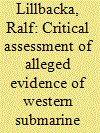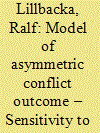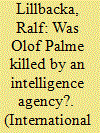| Srl | Item |
| 1 |
ID:
141630


|
|
|
|
|
| Summary/Abstract |
The submarine intrusions in Swedish territorial waters in the 1980s have received extensive attention. According to one theory, after the incident in 1981 when a Soviet submarine ran aground close to a Swedish naval base, Western submarines conducted subsequent intrusions as a psychological operation to affect Swedish foreign policy. In support of such claims, submarine observations and interviews with high-ranking Western officials have been put forth. However, the proposed evidence presented in Ola Tunander's article ‘Subs and PSYOPs’ in Intelligence and National Security can either be refuted or is inconclusive.
|
|
|
|
|
|
|
|
|
|
|
|
|
|
|
|
| 2 |
ID:
188371


|
|
|
|
|
| Summary/Abstract |
The article assesses a model predicting outcome in counterinsurgencies based on the counterinsurgent’s exposure to external friction and strategy. Unfavorable opinions, as well as insurgents’ access to third-party support and sanctuaries, constitute sources of external friction. Strategies were categorized as mainly kinetic or population-centric. The model predicts: (1) counterinsurgents lose in contexts with high external friction regardless of strategy; (2) counterinsurgents applying a population-centric strategy win if external friction is low; (3) counterinsurgents applying a purely kinetic strategy win if external friction is low only by obtaining distinct tactical superiority. The model correctly predicted 27 of 30 examined cases.
|
|
|
|
|
|
|
|
|
|
|
|
|
|
|
|
| 3 |
ID:
175671


|
|
|
|
|
| Summary/Abstract |
The case study examined the WWII operation “Market Garden” from the perspective of Clausewitzian simplicity, a general principle implied in von Clausewitz’s “On War,” suggesting that the disruptive impact of nonlinearity, friction and unpredictability can be counteracted by reducing necessary preconditions for success. It was demonstrated that estimates of ex post likelihoods of success, calculated from the relative achievement of objectives in various parts of the operational area, corresponded inversely to the number of preconditions known ex ante, which supports the notion that Clausewitzian simplicity facilitates realistic assessment of the probability of operational success.
|
|
|
|
|
|
|
|
|
|
|
|
|
|
|
|
| 4 |
ID:
167494


|
|
|
| 5 |
ID:
188269


|
|
|
|
|
| Summary/Abstract |
A model suggests that Schelling salience through social traplike processes can generate dysfunctional organizational mindsets that increase the likelihood of intelligence failure. Schelling salience refers to how certain aspects can spontaneously and tacitly become collectively cognitively prominent, and thus, coordinate behavior. Short-term benefits of a predominant mindset may generate long-term biases in analysis, collection, and decisionmakers’ responsiveness. Strong mindsets do not inevitably generate intelligence failures. However, a particular organizational state, referred to as a “pleasant attractor,” where sustained strategies produce satisficing outcomes and alternative strategies are more uncertain and/or costly, is conducive to biased mindsets causing intelligence failures. Findings from an examination of nineteen historical cases of intelligence failures and successes, with an emphasis on four sequences of cases with an initial intelligence failure, supported the model.
|
|
|
|
|
|
|
|
|
|
|
|
|
|
|
|
| 6 |
ID:
153162


|
|
|
|
|
| Summary/Abstract |
Perhaps the central question in the field of counterintelligence is: what drives a spy? Intelligence services are routinely trying to identify individuals who may be susceptible to recruitment. This interest has inspired several studies regarding the motivation of spies. The bulk of this research has been concerned primarily with more or less “pathological” psychological traits, for example, pursuit of easy money and/or a desire for revenge, often fueled by character flaws that emerge under stress. While highly successful in identifying psychological markers, previous research has largely ignored the potential role of social factors.
|
|
|
|
|
|
|
|
|
|
|
|
|
|
|
|
| 7 |
ID:
101127


|
|
|
|
|
| Publication |
2010.
|
| Summary/Abstract |
n recent years, and particularly around the time of his birth-centenary in 2003, George Orwell's reputation has come under a cloud. Both his unexampled honesty as a writer and his stainless political idealism have been brought into question. This article takes a further tentative step into this hitherto forbidden region by exploring the connections of Eric Blair and Eileen O'Shaughnessey with various espionage agents and intelligence networks in Barcelona in the spring of 1937. Although the argument is founded on a range of original contemporary documentation, as with many Spanish Civil War stories, facts are complicated and conclusions necessarily provisional.
|
|
|
|
|
|
|
|
|
|
|
|
|
|
|
|
| 8 |
ID:
104251


|
|
|